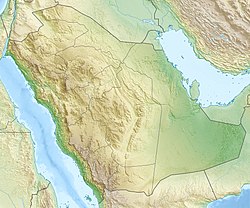Top Qs
Timeline
Chat
Perspective
Al Hejr
15th chapter of the Qur'an From Wikipedia, the free encyclopedia
Remove ads
Al-Ḥijr (Arabic: الحِجْرْ, lit. 'The Stoneland')[1] is the 15th sūrah (chapter of the Quran). It has 99 āyāt (verses).
Regarding the timing and contextual background of the revelation (asbāb al-nuzūl), it is an Meccan surah revealed during the mid period and received by Muhammad shortly after chapter 12, Yusuf, during his last year in Mecca. Like other surahs of this period, it praises God. Parts of the verses 4-74 are preserved in the Ṣan‘ā’1 lower text.[2]
This surah takes its name from 80th verse (āyah),[3] which refers to Mada'in Saleh, a pre-Islamic archaeological site, also called Hegra (from Arabic: الحِجَارَة, romanized: al-ḥijāra, lit. 'the Stones') or al-Ḥijr (Arabic: الحِجر, romanized: al-ḥijr, lit. 'the Stone').
Remove ads
Summary
- 1-3 Unbelievers will one day wish themselves Muslims
- 4-5 Every nation has its day of grace
- 6 Muhammad charged with demoniacal possession by the disbelievers (the Quraysh)
- 7 The unbelievers say a true prophet would have come with a company of angels
- 8 Angels are not sent to gratify curiosity, but to minister judgment
- 9 God the revealer and preserver of the Quran
- 10-11 The former prophets were laughed to scorn
- 12-15 The scoffing Quraysh judicially blinded
- 16-20 God declares his glory in the heaven and the earth
- 21-22 He is active in every part of Nature
- 23-25 He is the God of life, death, and judgment
- 26-29 God says men created of clay—the Jinn of fire
- 29-33 Iblis, unlike the angels, refuses to prostrate to Adam
- 34-38 He is cursed and respited until the judgment
- 39-40 Satan declares to God his purpose to seduce men
- 41-42 The elect are safe from Satan’s power
- 43-44 The seven gates of hell will receive Satan’s followers
- 45-50 Paradise joys in store for true believers
- 51-77 The story of Abraham and Lot's conflict
- 78-79 The unbelieving Midianites are destroyed
- 80-81 The scoffing inhabitants of al Hijr reject their prophets though accompanied with miracles
- 82-84 Rock-hewn houses fail to save them
- 85-86 The heaven and earth created in righteousness
- 87 Command to repeat the seven verses (al-Fatiha)
- 88-90 Muhammad not to consider the prosperity of infidels
- 91-93 The enemies of God will surely be punished
- 94-96 Muhammad commanded to preach boldly
- 97-99 He is exhorted to praise and serve God until death [4]
Remove ads
Central theme
This surah contains brief mentions of Tawhid, and provides an admonition to the disbelievers. The primary subjects of the surah are:
- cautioning the individuals who dismissed the message and
- providing solace and support to Muhammad,
The Quran never limits itself to mere rebuke; reproach and reprimand. It depends on its statute. The surah contains brief contentions for Tawhid and admonition in the tale of Adam and Satan.[5]
Remove ads
Exegesis
15:9 Preservation of the Quran
15:9 We have, without doubt, sent down the Message; and We [note 1] will assuredly guard it (from corruption). Translation Yusuf Ali (Orig. 1938) [6]
Ibn Kathir says, "God, may He be exalted, stated that He is the One Who revealed the Dhikr to him, which is the Qur'an, and He is protecting it from being changed or altered".[1]
Notes
References
External links
Wikiwand - on
Seamless Wikipedia browsing. On steroids.
Remove ads



